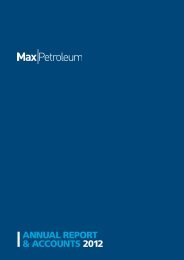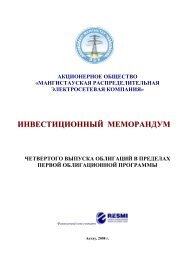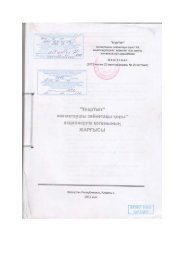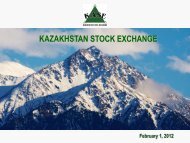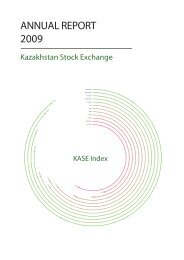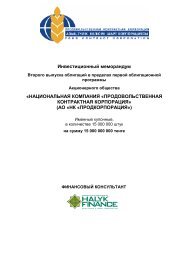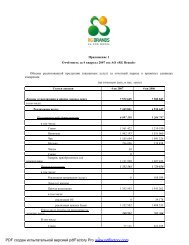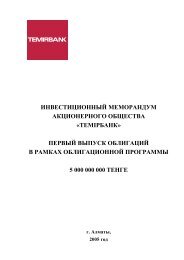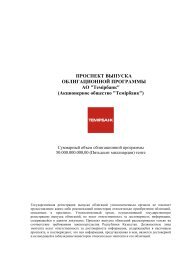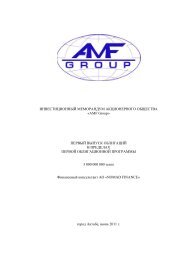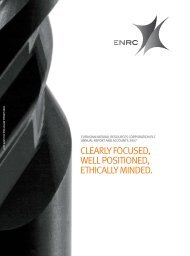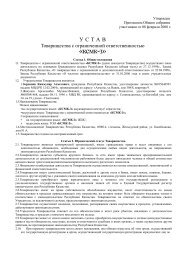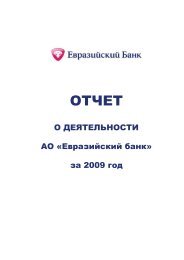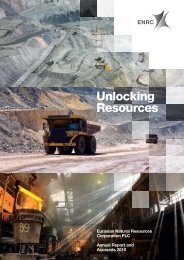JPMorgan - KASE
JPMorgan - KASE
JPMorgan - KASE
You also want an ePaper? Increase the reach of your titles
YUMPU automatically turns print PDFs into web optimized ePapers that Google loves.
In addition, we incurred production bonuses, which are based on cumulative production levels, of<br />
$0.4 million for South Kumkol (compared to $0.3 million in 2000), $0.5 million for Kumkol North<br />
(compared to none in 2000) and $2.8 million for Kumkol South (compared to $3.6 million in<br />
2000).<br />
Transportation<br />
The pipeline tariff from the CPF to Shymkent depends on the ultimate destination of the crude<br />
oil. In 2001, the tariff charged in respect of crude oil destined for export was $1.41/Bbl (compared<br />
to $1/Bbl for 2000), while the tariff relating to crude oil processed in the refinery was $0.84/Bbl<br />
(compared to $0.81/Bbl for 2000).<br />
The following table sets out the components of our transportation costs:<br />
2001 2000<br />
($000’s)<br />
Pipelinecosts .......................................................... 33,396 25,152<br />
Kazgermunai transportation costs ........................................ 8,829 —<br />
Railwaytransportation .................................................. 6,255 —<br />
Otherrelatedtransportationcosts ........................................ 1,757 —<br />
Total.................................................................. 50,237 25,152<br />
The absolute increase in transportation costs between 2001 and 2000 resulted from the increase<br />
in production, the inclusion of results of Kazgermunai for the whole year as opposed to one<br />
month and our first non-FCA sale to the Black Sea.<br />
Refining<br />
The total refining costs in 2001 were $20.6 million, or $0.78/Bbl of crude oil processed, compared<br />
to $12.6 million, or $0.75/Bbl, for 2000. The $8.0 million absolute increase in refining costs<br />
resulted from the inclusion of one full year of results from the refinery and increased processing<br />
in 2001. In addition, the increase on a per barrel basis reflected increased heat and energy costs<br />
during 2001 due to a change in contractual terms with the local power station. As a result, we<br />
paid full market rates for power in 2001 as opposed to reduced rates in 2000. Correspondingly,<br />
HOP charged market prices for its fuel oil sales to the power plant.<br />
Crude Oil and Refined Product Purchases<br />
The $30.7 million increase in cost from $48.1 million in 2000 to $78.8 million in 2001 resulted<br />
principally from the increased volumes of crude purchased from third parties in 2001 (700,088<br />
tonnes compared to 368,823 tonnes in 2000) at the average crude purchase price in 2001 of<br />
$12.17/Bbl. This increase was partly offset by lower prices for both crude oil and refined products<br />
in 2001 and lower volumes of refined products purchased for resale.<br />
Selling<br />
Downstream selling expenses of $13.7 million in 2001 (compared to $7.7 million in 2000)<br />
increased due to the inclusion of a full year of Downstream operations, increased sales volumes<br />
and a one-time charge of $1.2 million for the storage of fuel oil. Upstream selling costs of $5.6<br />
million in 2001 (compared to nothing in 2000) consisted mainly of export costs associated with<br />
the Kazgermunai joint venture.<br />
General and Administrative<br />
Total general and administrative expenses were $55.2 million in 2001 and $44.6 million in 2000.<br />
The following table sets out the breakdown of these expenses between activities and, in the case<br />
of Upstream and Downstream activities, reflects them on a per barrel basis:<br />
45



